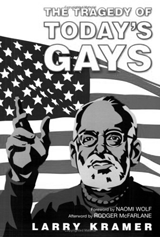A year after Cooper Union speech, no positive vision for young gay men
Kramer squarely misplaces the blame for his own guilty conscience onto the shoulders of an abstract giant he calls “today’s gays” but could just as easily have described as “everyone else.”
Commentators have ignored the fact that the Cooper Union speech was first and foremost a confession to homicide. Kramer says so himself. When he said, “I know I murdered some of them,” and then sketched out the briefest descriptions of two young men he infected with HIV, he betrayed a complicated motivation for his most recent jeremiad against the gay male community.
We don’t learn these victims’ names, or much of anything else about them; Kramer limits his description of one life destroyed to a “sweet young boy who didn’t know anything and was in awe of me.”
He was claiming responsibility, in a sense, but never directly, without tangent or abstraction. He clearly prefers that the burden be borne by others. In fact, he heaps the burden onto all of us, for the world to see.
“I wish we could understand and take some responsibility for the fact that for some 30 years we have been murdering each other with great facility and that down deep inside of us, we knew what we were doing,” he declared.
Kramer is grappling with the self-knowledge that years after castigating gay men as “ Faggots” in his 1978 best-selling novel he himself was promiscuous and barebacked, knowing he was infected, and spread disease. He defined the moment at which he believes his culpability began, saying at Cooper Union, “Starting in 1984, when we were told it definitely was a virus, this behavior turned murderous.” What Kramer was trying to come to grips with in his speech, but never actually faced, was the glaring hypocrisy of his own biography.
Just as he had earlier simplified the definition of one generation of gay men to “faggots,” Kramer at Cooper Union threatened to label another in viciously negative light as “murderers.”
As a community, we must respond by looking deeper into this self-styled heroic truth-teller’s eyes and examine the details of his own cop to murder. He never explained himself at Cooper Union. If we do not expect of Larry Kramer a deep and truthful consciousness, without rhetorically clever evasions of real meaning, then those of us in the current generation of gay men under 35 who need to look at ourselves darkly in the mirror will never be able to demand it of ourselves.
If we make excuses for Kramer’s doublethink––declaring “faggot” behavior disgraceful, and then barebacking while infected, despite all the platitudinous pleading––then that same matrix of excuses will be available for some of us to justify killing each other.
If we do not confront Larry Kramer, he will leave us with the helpless self-definitions created in “Faggots” and renewed at Cooper Union––images of gay men that have more to do with Kramer himself, than with everyone else. His speech, in insidious fashion, implied that because he once acted reprehensibly, we are all doing so now.
Unfortunately, in his speech, Kramer never really dug deep to explain to us what he was thinking or feeling when he spread HIV. If he had, he might have taught those of us who have not yet learned this hard lesson how to avoid it and instead respect other gay men, and protect them with the same zeal that hopefully we employ in safeguarding ourselves. Respecting each other is something Kramer has always had trouble teaching.
He only dedicated three or four sentences in his speech to the circumstances of how he infected other men. Far more space was dedicated to discussions of his lost appetite and the sad complaints he has about life with AIDS. In fact, the passage that included his confession ends with his recollection of when he himself became infected. Recalling a trick he engaged in order to make a boyfriend jealous, he declared, “I murdered myself on that one.” We learn nothing more about his victims, and while we hear his self-pity, we gain no greater insight into his own motivations for what he clearly views as his recklessness.
Cooper Union should have afforded the time to talk about the men Kramer said he killed with a disease he gave them. That is the point he is striving for with “The Tragedy of Today’s Gays”––that we learn to take responsibility for HIV transmission by using the strongest, most honest, and most direct language in talking about it. He used the word murder, because volition is at the heart of the acts for which Kramer said he is responsible.
“In case you haven’t noticed, we have lost the war against AIDS,” Kramer also said.
We don’t need to hear that from Kramer. Instead, what we need to learn is how to trust, respect and love each other as we must love ourselves. We must learn to examine the complicated, meaning of our actions, try to understand them, and, most importantly, take full responsibility for them. At Cooper Union last year, and in “ The Tragedy of Today’s Gays,” Kramer merely shows the way toward giving up and blaming everyone else.
gaycitynews.com



































